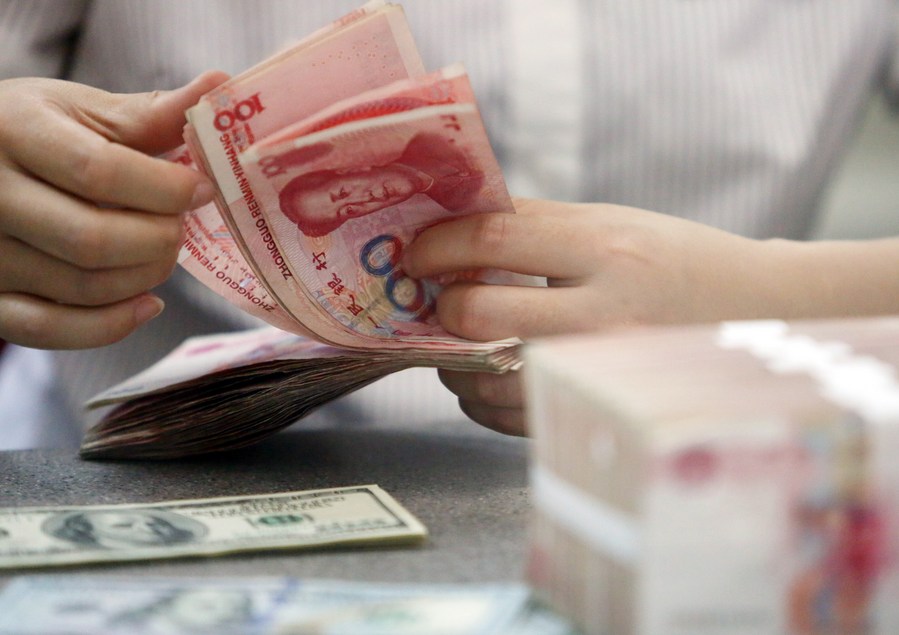Former IMF Secretary: Higher weighting of RMB in SDR basket to facilitate RMB’s internationalization
The International Monetary Fund (IMF) raised the weighting of the Chinese renminbi (RMB) in the Special Drawing Rights (SDR) currency basket from 10.92 percent to 12.28 percent on May 11, after completing a quinquennial review.

A worker counts Chinese currency renminbi (RMB) at a bank in Linyi, east China's Shandong Province. (Xinhua/Zhang Chunlei)
The composition of the basket – which includes the U.S. dollar, the euro, RMB, the Japanese yen, and the British pound sterling – remains the same, with the weighting of RMB continuing to rank in the third top spot.
The updated basket weighting will come into effect on Aug. 1, 2022.
In 2016, the IMF included the RMB in its SDR basket as a fifth currency. The IMF’s decision to add the RMB to the basket of currencies is a milestone in the integration of China’s economy into the global financial system, and shows IMF’s recognition of China’s achievements in its reform and opening-up, particularly China’s monetary policy and financial system, Lin Jianhai, former Secretary to the IMF and the Board of Governors, said in an exclusive interview with People’s Daily Online.
Lin added that the RMB’s inclusion has made the SDR basket more diversified and is more representative of the current role the currencies in the basket play in the global economy. It will help improve the stability of the SDR, and make the SDR more attractive as an international reserve asset. This will also boost the international community’s confidence in RMB-denominated financial assets, and increase the appeal of RMB assets among international investors.
The RMB’s inclusion is an important step to make the currency more internationalized. It marks a new start for China to deepen its financial reforms and for the IMF to improve financial and monetary systems. The review confirmed the rationality of the composition of the basket again, and increased the RMB’s weighting, indicating the continuous progress of the internationalization of the RMB. This is a significant form of recognition for China and a driving force for the country to continue the process of internationalizing the RMB, as well as underlining its responsibilities.
Lin said that steady economic growth is the foundation for the further internationalization of the RMB. China’s economy has enjoyed rapid development over the decades, having emerged as the second largest economy and the largest trading nation in the world over the past 40 years. This has laid a solid foundation for the phased internationalization of the RMB. China’s economy faces multiple challenges at the moment. To further promote the internationalization of the RMB, it is critical to maintain stable economic growth, continue to improve macroeconomic and financial frameworks, and prevent volatility in the financial market.
Lin believes that continued reform and opening-up will guarantee the further internationalization of the RMB. China’s increasing foreign economic activities have brought about more overseas transactions and greater usage of the RMB. It is essential to promote the opening-up of the capital account in a steady way, open the financial sector wider, and expand the use of RMB internationally.
Improving the financial system and deepening the development of the financial market will provide a boost for the further internationalization of the RMB. The depth, width and opening of China’s domestic financial market will help strengthen foreign markets’ confidence in the country’s currency.
Lin also introduced that China’s flexible exchange rate system will also help to propel the internationalization of the RMB.
The advancement of RMB settlements in cross-border trade meanwhile plays another indispensable role in China’s efforts to make RMB an international currency, he added. China’s biggest strength in this process lies in the sheer size of its foreign trade. Improving RMB settlements for cross-border trade will provide a strong boost to its internationalization.
The RMB’s inclusion in the SDR and a higher weighting for RMB in the basket is a major event for China, the IMF and the organization’s member states, and will deliver long-term benefits. Currencies included in the SDR basket will continue to serve as major reserve currencies across the world for the foreseeable future. The further internationalization of the RMB requires the stable growth of China’s economy, a continuation of high-level opening-up, and the continuous improvement of the financial system and markets. Looking ahead, a higher weighting of the RMB is bound to open a brand new phase in the internationalization of China’s currency.
Photos
 China’s central bank to issue commemorative coins on cultural theme of auspiciousness, including two heart-shaped coins
China’s central bank to issue commemorative coins on cultural theme of auspiciousness, including two heart-shaped coins Population of endangered black-headed gulls exceeds 10,000 mark in NE China’s coastal city of Panjin
Population of endangered black-headed gulls exceeds 10,000 mark in NE China’s coastal city of Panjin China's self-developed floating airship breaks record
China's self-developed floating airship breaks record Chinese germplasm bank conserves biodiversity in warm temperate zone
Chinese germplasm bank conserves biodiversity in warm temperate zone
Related Stories
- Interview: RMB's use on rise in int'l payments, says expert
- Yuan to remain largely stable despite hurdles
- Interview: RMB sees rising importance as Chinese economy grows, says London finance policymaker
- European experts eye stronger growth of RMB as global currency reserve
- China's RMB cross-border payments soar in 2021: report
- China to keep RMB exchange rate generally stable
- RMB retains 4th spot as most active currency for global payments
- RMB becomes 4th most active currency for global payments: SWIFT
- China to expand cross-border use of RMB
- RMB internationalization inevitable trend as Chinese economy continues to grow
Copyright © 2022 People's Daily Online. All Rights Reserved.






